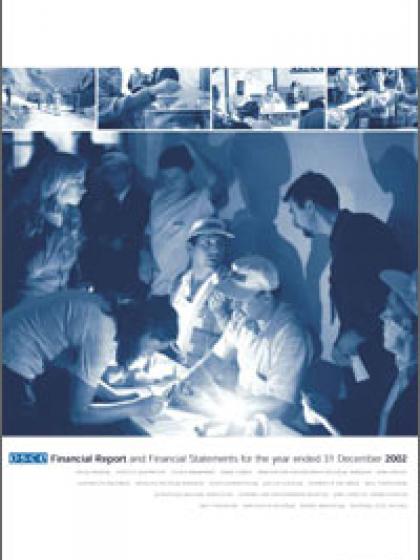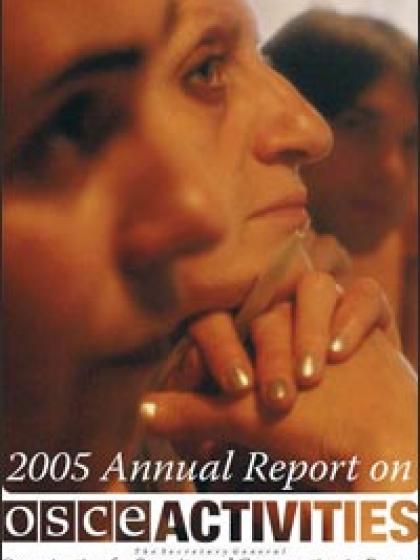Publications
Financial Report and Financial Statements for the year ended 31 December 2002 and the Report of the External Auditor
Publishing date: 26 September 2003
Collections: OSCE Financial Reports
Content type: Annual report
Where we are: OSCE Secretariat
Publisher: Organization for Security and Co-operation in Europe
The financial part of the Annual Report 2002
OSCE Annual Report 2021
Publishing date: 21 June 2022
Collections: OSCE Annual Reports
Content type: Annual report
Where we are: OSCE Secretary General
Publisher: Organization for Security and Co-operation in Europe
The OSCE Secretary General’s Annual Report gives an overview of the Organization's activities and its co-operation with partner states and other organizations.
Sensitive and Respectful Treatment of Hate Crime Victims: Training Course for Criminal Justice Professionals
Publishing date: 17 February 2022
Content type: Guide / manual / handbook
Where we are: OSCE Office for Democratic Institutions and Human Rights
What we do: Tolerance and non-discrimination
Publisher: Organization for Security and Co-operation in Europe
The curriculum provides a step-by-step description of how to conduct training for police, prosecutors and judges on the sensitive and respectful treatment of hate crime victims. It aims to improve their knowledge and skills on how to respond to and interact with hate crime victims and by doing so, empower victims, prevent re-victimization and build a sense of trust in the criminal justice process. The curriculum has been developed in a modular structure, enabling trainers to integrate relevant modules into various training programmes.
Compendium: Practices of Civil Society and Government Collaboration for Effective Hate Crime Victim Support
Publishing date: 18 March 2022
Content type: Guide / manual / handbook
Where we are: OSCE Office for Democratic Institutions and Human Rights
What we do: Tolerance and non-discrimination
Publisher: Organization for Security and Co-operation in Europe
This Compendium has been created by the the OSCE Office for Democratic Institutions and Human Rights (ODIHR), in partnership with the Association of Counselling Centers for Victims of Right-Wing, Racist and Antisemitic Violence in Germany (VBRG).
Hate Crime Victim Support: Policy Brief
Publishing date: 22 April 2022
Content type: Guide / manual / handbook
Where we are: OSCE Office for Democratic Institutions and Human Rights
What we do: Tolerance and non-discrimination
Publisher: Organization for Security and Co-operation in Europe
Hate Crime Victim Support: Policy Brief Hate Crime Victim Support: Policy Brief This policy brief condenses the knowledge and key findings of the Enhancing Stakeholder Awareness and Resources for Hate Crime Victim Support (EStAR) project implemented by the OSCE Office for Democratic Institutions
OSCE Annual Report 2005
Publishing date: 25 April 2006
Collections: OSCE Annual Reports
Content type: Annual report
Where we are: OSCE Secretary General, OSCE Secretariat
Publisher: Organization for Security and Co-operation in Europe
The Annual Report on OSCE activities provides an overview of the Organization's activities in its field operations and institutions as well as its co-operation with other international organizations
Quality Specialist Support Services for Hate Crime Victims: Training Course
Publishing date: 5 April 2022
Content type: Guide / manual / handbook
Where we are: OSCE Office for Democratic Institutions and Human Rights
Publisher: Organization for Security and Co-operation in Europe
Hate crime is a manifestation of discrimination and intolerance that has a profound impact on victims, communities and societies. Victims of hate crimes require specialist services to support them in their recovery from these crimes, to enable them to effectively participate in the criminal justice process and to regain a sense of agency. This support includes practical help, emotional and psychosocial support, and advice relating to legal and financial issues, as well as community work. Such specialist support is tailored specifically to each individual who is a victim of or a witness to a hate crime, has experienced a hate incident or is affected by a hate crime committed against someone else.
Handbook for the Observation of Election Campaigns and Political Environments
Publishing date: 14 October 2021
Collections: Election handbooks
Content type: Guide / manual / handbook
What we do: Elections
Publisher: Organization for Security and Co-operation in Europe
An essential part of election processes are election campaigns, in which candidates compete for voter support. During election campaigns political actors energize society, invigorate and mobilize the electorate, but at the same time these are periods when fundamental freedoms are put to the test. Election campaigns provide an opportunity for all election stakeholders, including the authorities, political parties and voters, to demonstrate respect for fundamental freedoms and human rights.
Amicus Curiae in Modern Justice
Publishing date: 12 June 2022
Content type: Guide / manual / handbook
Where we are: OSCE Project Co-ordinator in Ukraine (closed)
What we do: Human rights, Roma and Sinti
Publisher: Organization for Security and Co-operation in Europe
This publication includes a set of guidelines explaining the functioning of amicus curiae instrument in justice system. It will be useful to anyone intending to file an amicus curiae brief to the Constitutional Court of Ukraine (the CCU), as well as to the CCU judges and staff. It includes
Guidelines for Observation of Election Campaigns on Social Networks
Publishing date: 11 October 2021
Collections: Election handbooks
Content type: Guide / manual / handbook
Where we are: OSCE Office for Democratic Institutions and Human Rights
What we do: Elections
Publisher: Organization for Security and Co-operation in Europe
Online social networking sites have moved election campaigns into a new era of communication, in which voters have wider channels to express their opinions. While social networking sites provide space for voters to enhance their direct participation in campaigns and enable electoral contestants to better mobilize support, the use of social networks, especially during election campaigns, carries a wide array of challenges.










